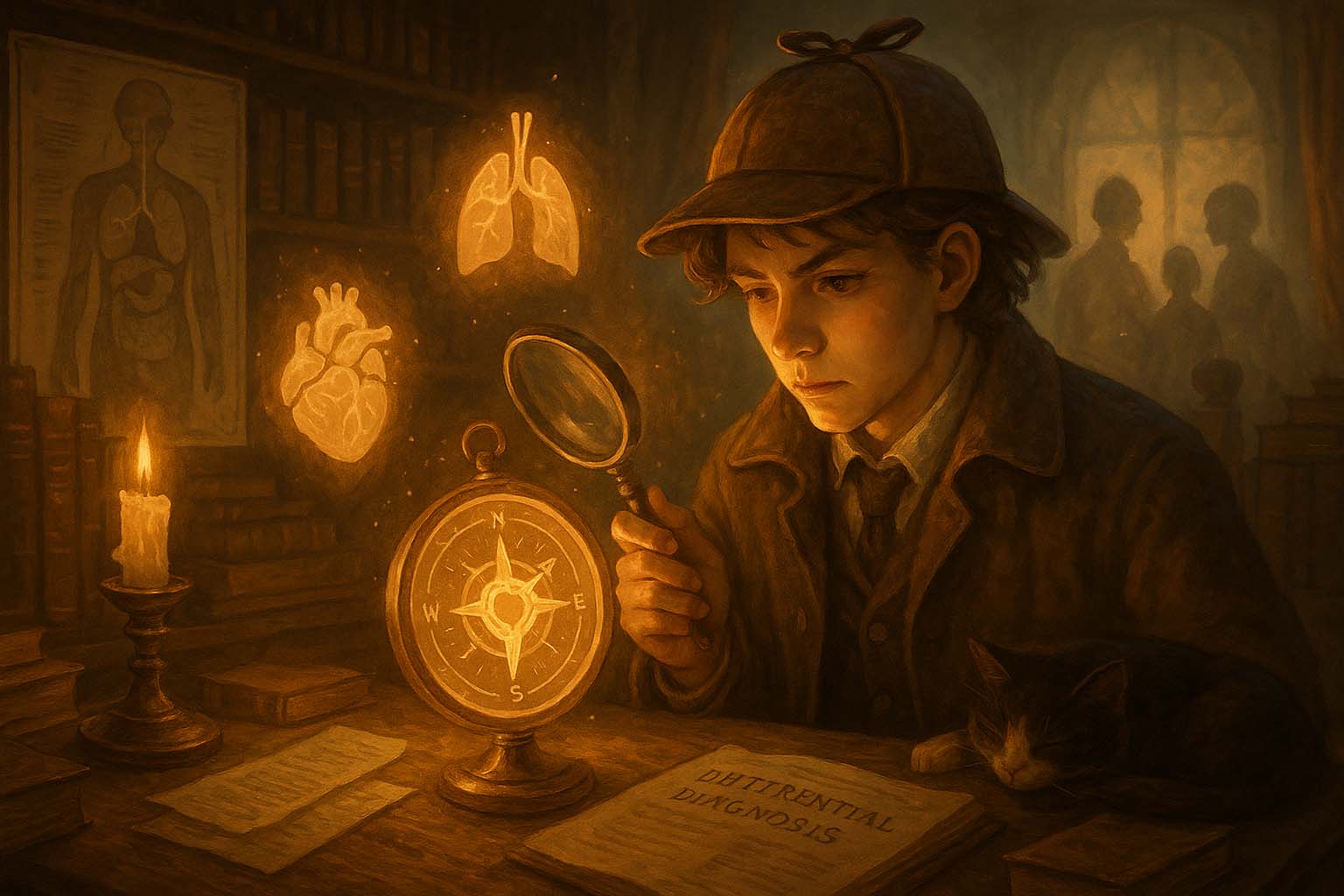
General Medicine
- Posted by admin
- Categories Primary, Community & Continuity Care
- Date May 21, 2025
- Comments 0 comment
The Inner Investigator’s Domain – Cracking the Cases of Complex, Multi-System Clues
1. Introduction: The Scene of the Specialty
Step into the shoes of a General Medicine sleuth.
Internal Medicine detectives are the ultimate generalists—called in when the clues are scattered, the culprit elusive, and the patient’s story tangled across multiple systems. They don’t just look at a symptom—they scan the whole map. Welcome to a world where a single abnormal blood test can unlock a hidden narrative, and a well-timed question can change the entire course of an investigation.
2. Key Mysteries They Solve (Common Conditions)
These detectives specialise in solving cases involving:
- Sepsis – a classic misdirection hiding behind a benign start.
- Diabetes & Hypertension – chronic conundrums that quietly rewire the body.
- Autoimmune Disorders – rare and riveting diagnoses that mimic many.
- Multimorbidity in the Unwell Patient – an acute crisis calling for big-picture thinking.
Each case demands a methodical mind, a broad base of knowledge, and the patience to follow every thread until the pattern appears.
3. Their Trusted Tools & Techniques
Every detective has their kit—and in General Medicine, tools may include:
- Investigative Instruments – stethoscopes, ophthalmoscopes, and reflex hammers.
- Imaging and Insight – chest X-rays, abdominal CTs, and echocardiograms.
- Interviews and Intuition – a careful history is often the most revealing clue.
- Laboratory Logic – blood panels, inflammatory markers, renal and liver function tests.
This is not guesswork. It’s broad-based pattern recognition, differential diagnosis, and clinical intuition honed by endless bedside encounters.
4. The Charms of This Field: Why It Captivates the Curious
- Complex Puzzles: No two cases are the same; even straightforward symptoms can have tangled roots.
- Interdisciplinary Collaboration: Liaise daily with surgeons, radiologists, allied health, and specialists.
- Lifelong Discovery: The field evolves constantly—every ward round is a new case file.
- Holistic Patient Care: Build rapport, continuity, and connection with patients across time and systems.
This specialty doesn’t chase the exotic—it makes sense of the everyday in all its messy complexity.
5. Challenges: The Toughest Cases They Face
- Diagnostic Dilemmas – Vague symptoms like fatigue or fever with no clear source.
- Emotional Toll – Managing uncertainty, chronicity, and end-of-life conversations.
- Decision Fatigue – Balancing polypharmacy, comorbidities, and hospital discharge planning.
- Systemic Barriers – Time constraints, bed shortages, and siloed communication.
But the experienced general physician knows: even chaos reveals patterns if you step back far enough.
6. Famous Cases and Hallmark Clues
- The “Classic Presentation” – Chest pain with ST-elevation: the clean-cut MI.
- The “Zebra” – Lupus presenting as psychiatric symptoms.
- The “Aha Moment” – Realising hyponatraemia isn’t the problem—it’s the clue to a hidden malignancy.
7. Your Training Trail: How to Join the Investigation
To become an Internal Medicine detective:
- Start with broad-based clinical rotations to master the art of the differential.
- Learn to listen deeply—the history often whispers what the tests cannot scream.
- Get comfortable with uncertainty and complexity—this is medicine’s messy heart.
- Join general medical units, audit difficult cases, and never stop asking: What else could it be?
Whether you’re decoding a fever of unknown origin or managing ten medications in one frail patient, every shift sharpens your clinical craft.
8. Final Words: The Signature of the General Medicine Detective
Internal Medicine detectives are the keepers of breadth, the weavers of complex tapestries, the physicians who see the forest and the trees.
They don’t just treat symptoms—they interpret patterns across systems, timelines, and lives.
So if you’re drawn to depth, dialogue, and the endless intrigue of what makes a body tick—
then this is your casebook to open.
You may also like

Emergency Medicine

Occupational Medicine

